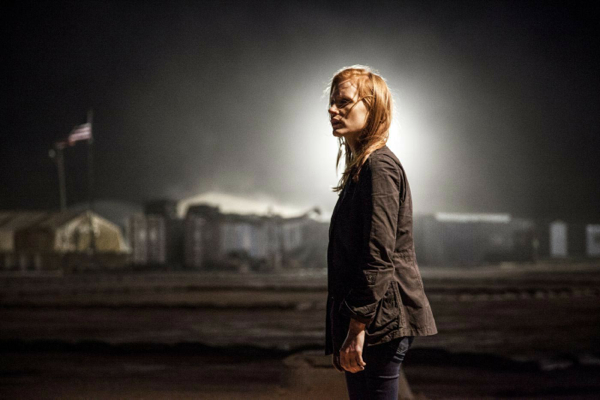Movie review by Greg Carlson
Residing somewhere inside the cacophony of the debate over whether Kathryn Bigelow’s harrowing “Zero Dark Thirty” legitimately “endorses” torture is one of the most elementary functions of drama: the depiction of a thing does not necessarily indicate the dramatist’s affirmation of that thing. In the Theban trio, Sophocles sought to examine, among other ideas, the conflict between divine law and human law, but we don’t spend much time accusing the tragedian of championing incest or parricide. Bigelow would have erred by not addressing the “enhanced interrogation” techniques applied to the so-called enemy combatants detained after 9/11, and her film, stylistically dependent on a high degree of believability, at least allows us to ask whether it takes a bad person to catch a bad person.
With its clinically procedural structure, deliberate jargon, and nimble editing, “Zero Dark Thirty” belongs to the tradition of political and military thriller that reflects back to the viewer what he or she seeks to find. Compare two voices in the “New York Times.” Manohla Dargis says, “[This] juxtaposition of the abuse and the massacre suggests, in cinematic terms, that torture does not save lives.” Frank Bruni wrote that the depiction of torture as placed in the film “produces information vital to the pursuit of the world’s most wanted man.” There is something undeniably involving about a movie that can simultaneously be described as pandering to the Obama administration and the one led by George W. Bush.
The rhetoric surrounding the suggestion that the filmmakers somehow managed to obtain access to classified information is potentially as fascinating as the torture question, but Bigelow’s dedication to the detailed reconstruction of the compound raid itself – the climactic showstopper that the audience eagerly awaits as a satisfying narrative payoff to the grind of the connect-the-dots timeline that takes up the majority of the film – carries with it a set of challenges. Even if one accepts the claim that Bigelow carefully withholds opinion via the impassive, mask-like visage of Jessica Chastain’s CIA agent Maya (not to mention the spare use of Alexandre Desplat’s score), the final section of “Zero Dark Thirty” vibrates with the awesome, frightening power of America’s military machine.
As soon as the fire-eating Navy SEAL team members are first briefed on their top-secret objective, “Zero Dark Thirty” crackles with the age-old sense of America’s dizzying military superiority. Bigelow’s use of point-of-view, night vision green imagery via handheld photography places the viewer shoulder to shoulder with the soldiers. Given the outcome of Operation Neptune Spear and the manner in which it is imagined cinematically, I would venture a guess that applications to any corresponding military programs will not be in any danger of decline.
I for one do not believe, like Peter Rainer, that Bigelow has made an amoral film. As a work of contemporary historical fiction, we can wring our hands that people will watch “Zero Dark Thirty” and accept it as the document of record on the death of Osama bin Laden. Similar arguments about “history according to the movies” were offered when Oliver Stone explored a network of theories both plausible and ridiculous in “JFK” in 1991. With its release so soon after the events it dramatizes, “Zero Dark Thirty” feels very much like a movie of its moment. I wonder how we’ll think and talk about it two decades from now.
